
The findings show an absence of a systematic and coordinated plot to take over these schools and an absence of any concerted and deliberate plot to promote radicalisation and violent extremism of Muslim children in these schools or elsewhere
#TrojanHorse
tandfonline.com/doi/abs/10.108…
#TrojanHorse
tandfonline.com/doi/abs/10.108…
language used to talk about the issues of “radicalisation” & “extremism” is itself the subject of considerable debate (Kundnani 2012; Lynch 2013). There is also a difficulty in understanding fully these issues cos there is a lack of an objective or universally accepted definition
As soon as the media took hold of the allegations, there was huge publicity about the promotion of extremism, radicalisation & terrorism.
At the time, the press also expressed many irrational anxieties about these Muslim majority schools (Arthur 2015). Even though, from the
At the time, the press also expressed many irrational anxieties about these Muslim majority schools (Arthur 2015). Even though, from the
the beginning the West Midlands police had found no basis for intervention Nevertheless, it was obvious that both central & local govn reactions to the affair were to play a pivotal role in shaping the discursive parameters of the debate within counter-terrorism & securitisation
Peter Clarke, the former National Coordinator for Counter Terrorism, gathered 2000 documents and generated 2000 pages of interview transcripts from 50 witnesses. These included former headteachers, teachers, council staff and school governors.
In generating his account, Yarker (2014) cautions that Clarke’s background may've coloured the way he constructed the context in which he deployed his materials. Yarker (2014, 453) also accuses him of exaggeration/ interpreting relatively minor matters 2 favour his general stance
In this context, 2 of his observations are pertinent. 1 relates to the questions of this study & the 2nd to learning experiences. Clarke (2014, 12) admitted: “I neither specifically looked for nor found evidence of terrorism, radicalisation or violent extremism in the schools of 

Clarkeadmitted: “I neither specifically looked for nor found evidence of terrorism, radicalisation or violent extremism in the schools of concern in Birmingham.”
In other words, he cleared himself of bias from his previous role
In other words, he cleared himself of bias from his previous role
Importantly, he exonerated schools & children from ideologies which promote terrorism, radicalisation or violent extremism.
Nevertheless, Clarke (2014, 13) noted 3 deep apprehensions, raised by many witnesses involved in education, about the impact on children of what transpired
Nevertheless, Clarke (2014, 13) noted 3 deep apprehensions, raised by many witnesses involved in education, about the impact on children of what transpired
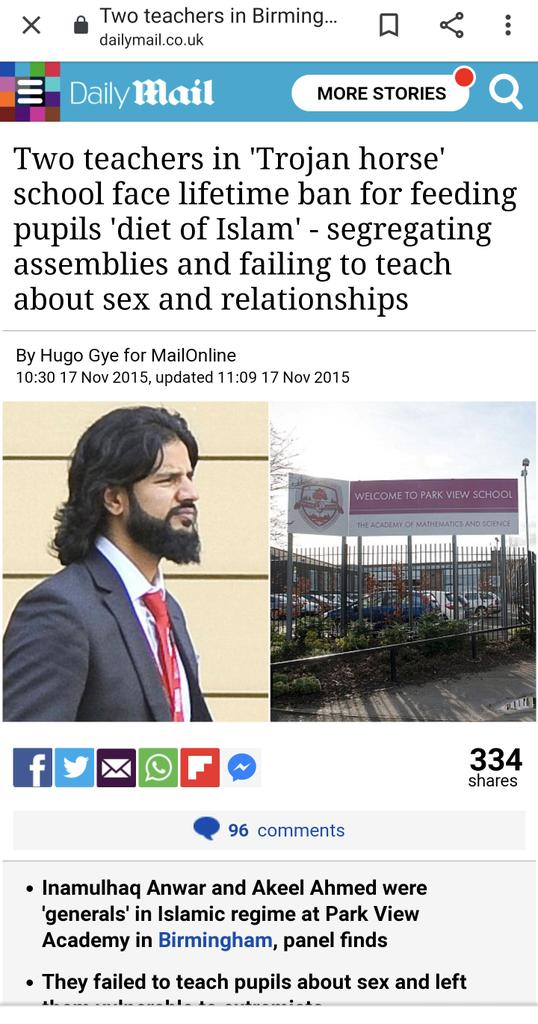
three deep apprehensions, raised by many witnesses involved in #education, about the impact on children of what transpired in some schools.
One concern was that some teachers “fear children are learning to be intolerant to #difference and #diversity.”
#Intolerance
One concern was that some teachers “fear children are learning to be intolerant to #difference and #diversity.”
#Intolerance

Should this be the case, then for Muslim children living & being educated in Britain in particular, this would appear to be a disservice to their #holistic #development that some Muslims often advocate (Coles 2008; Merry 2007; Niyozov and Memon 2011).
The school curricula in all schools of England for all children are to be balanced & broadly based and which promote the spiritual, moral, cultural, mental & physical development of pupils at the school and of society, & prepare pupils for the opportunities, responsibilities
for all children are to be #balanced and broadly based and which promote the #spiritual, #moral, #cultural, #mental & #physical #development of pupils at the school and of society, & prepare pupils for the opportunities, responsibilities & experiences of later life (DfE 2013). 







#balanced and broadly based & which promote the #spiritual, #moral, #cultural, #mental & #physical #development of pupils at the school & of society, & prepare pupils for the opportunities, responsibilities & experiences of later life (DfE 2013)
#QueerTheory #NoOutsiders



#QueerTheory #NoOutsiders




which promote the spiritual/moral/ cultural/mental/physical #development of #pupils at the school & of society,
& prepare pupils for the opportunities, responsibilities & experiences of later life (DfE 2013)
#NoOutsiders
#Epicentre #TrojanHorse



& prepare pupils for the opportunities, responsibilities & experiences of later life (DfE 2013)
#NoOutsiders
#Epicentre #TrojanHorse




Furthermore, Clarke (2014, 13) feared that young people rather than enjoying a broadening & enriching experience at school, are having their horizons constricted.
“They are not being equipped in school to flourish in the inevitable diverse environments of further education.



“They are not being equipped in school to flourish in the inevitable diverse environments of further education.




“They are not being equipped in school to flourish in the inevitable diverse environments of further education, the workplace or indeed any environment outside predominantly Muslim communities.”
It could be argued that a deficit curriculum was being adopted, ironically, in contrast to the inclusive approach advocated by MCB (2007). It also seems odd that these children’s outlook was being constricted since Muslims often claim to belong to a global community.
That they were being ill prepared beyond their own community would appear to be short sighted and may not serve their economic nor social ambitions, for these may be best served in preparing young people for cosmopolitan milieux.
Also, he raised concerns about their #possible #vulnerability to #radicalisation in the future.
He “heard evidence to the effect that there are real fears that their current experiences will make it harder for them to #question or #challenge radical influences”



He “heard evidence to the effect that there are real fears that their current experiences will make it harder for them to #question or #challenge radical influences”




The direct relationship between a “narrow” school experience & becoming assertive to challenge others is not necessarily given, since some people who have become radicalised or extremist have had “broad” experiences
Neither is it the case that a broad and balanced curriculum would necessarily prevent radicalisation. It may, however, be a possible by-product of the cumulative isolationist approach detected earlier, combined with personal, psychological and other external influences
Islamic radicalisation and terrorism emanate from a very heterogeneous population that varies markedly in terms of education, family background, socio-economic status and income (Christmann 2012,)
Therefore, #education ought to prepare all children not only to question or challenge radical influences but also injustices, oppressions and criminalities of all kinds.
Schools lay the #foundation and other agencies have a role in #building the rest of #society



Schools lay the #foundation and other agencies have a role in #building the rest of #society




The affair had been reported & discussed as a plot by the media. Bartoszewicz (2014), has characterised this affair as a plot and has tried to trace it historically to the 1980s. However, Kershaw (2014, 4), based on the evidence collated, found “little express evidence” 

However, Kershaw (2014, 4), based on the evidence collated, found “little express #evidence” to which he could point out “a #systematic #plot or coordinated #plan to take over schools serving students of predominantly Muslim faith or background.” 

However, he did find “a determined effort to change schools, often by unacceptable practices, in order to influence educational & religious provisions for the students served.” Nevertheless, these changes, he observed, were “also seen as a means to raise standards.” 







Nevertheless, these changes, he observed, were “also seen as a means to raise standards.” Thus he admitted that there was “a genuine and understandable desire amongst these groups to improve the education and opportunities for Muslim pupils.”
#UncharteredTerrority
#Ofsted



#UncharteredTerrority
#Ofsted




Unfortunately, one way of achieving this was through manipulation of school governance, & as such, he recommended guarding against such behaviour. Kershaw (2014) established that this was due to the many failures of the Council’s lack of accountability of academies outside the
Kershaw (2014) established that this was due to the many failures of the Council’s lack of accountability of academies outside the Local Authority (LA) & that there had “been co-ordinated, deliberate & sustained action, carried out by a number of associated individuals,
and that there had “been co-ordinated, deliberate and sustained action, carried out by a number of associated individuals, to introduce an intolerant and aggressive Islamic ethos into a few schools in Birmingham” (Clarke 2014, 14
In a similar vein, the BCC Report (2014a, 6) acknowledged there was “a powerful, hard-hitting and credible exposition of inappropriate activity by a small number of governors in a small number of schools in East Birmingham.”
However, like the Clarke report, it emphasised that there was “little eidence of a systematic plot & #NoEvidence of a conspiracy to #promote #radicalisation or #violent #extremism” (BCC 2014a, 6).
theguardian.com/education/2014…



theguardian.com/education/2014…




The examination of #Ofsted reports becomes relevant to better understand what, if anything, Ofsted uncovered about radicalisation, so that schools can learn lessons
The immense damage inflicted to the people of Birmingham by the way the affair has handled needs 2 be acknowledged



The immense damage inflicted to the people of Birmingham by the way the affair has handled needs 2 be acknowledged


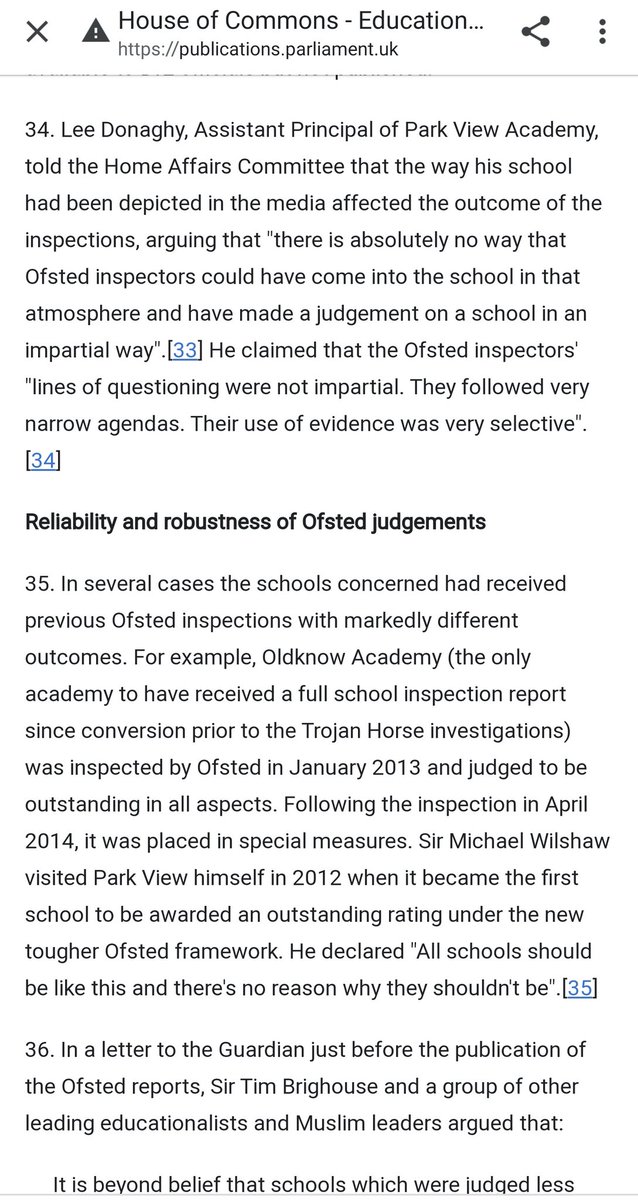

Pupils had to face reporters on a daily basis outside the school at a time when some of them were preparing for their GCSE exams. Many Birmingham schools with Muslim pupil majorities were being placed under scrutiny by educational & other state authorities s
Many Birmingham schools with #Muslim pupil #majorities were being placed under scrutiny by educational & other state authorities such that young Muslims, some of them as young as 4yrs & others, were being seen through the #lenses of #CounterTerrorism & #questioned insensitively 





The subsequent headlines’ portrayal of the attempt of “Muslims” to #infiltrate “our” #British #value system reinforced the status of Muslims as “others” and further strengthened sentiments at national level of singling out Muslims as a “suspect community” 







In other words, this exemplified the tendency in public debate to perceive the making of claims by minorities as representing a challenge to majority “traditional” values (Pecenka and Anthias 2014, 2)
It also shows the #relentless efforts being made to #perpetuate the monochromatic #portrayal of Muslim communities.
Consequently, the allegations and fallout from this are likely to #feed into #widespread negative views about Muslims and Islam.



Consequently, the allegations and fallout from this are likely to #feed into #widespread negative views about Muslims and Islam.




The impact of this on Muslims in Birmingham & beyond as they experience further scrutiny & questioning has resulted in them feeling even more anxious & fraught (Allen 2014). It will perpetuate Muslims as “others” who are seen 2 be incompatible with “our” norms/values/ way of life 







It will perpetuate Muslims as “others” who are seen to be incompatible with “our” norms, #values and way of life (Allen 2014).
Moreover, it may confirm existing pre-conceived ideas of Muslim communities undermining a #secular #liberal #consensus in Britain (Miah 2014).



Moreover, it may confirm existing pre-conceived ideas of Muslim communities undermining a #secular #liberal #consensus in Britain (Miah 2014).




The findings from Clarke (2014) ^ Kershaw (2014) point to the need for a deeper study of the Ofsted reports to uncover, among other things, the #contexts and #purposes to which Ofsted have used radicalisation 







The findings from Clarke (2014) ^ Kershaw (2014) point to the need for a deeper study of the Ofsted reports to uncover, among other things, the #contexts and #purposes to which Ofsted have used radicalisation
Context and Purposes?

Context and Purposes?


As far as could be ascertained, these reports have not been studied independently & analysed systematically in relation to their actual findings with a focus on radicalisation. Some of these “at risk” schools had glowing reports from Ofsted,
Some of these “at risk” schools had glowing reports from Ofsted, only to be placed in special measures in a short period. This, according to Yarker (2014, 454), raises questions about the existing inspection regime. 





At one point, City Council Leader Albert Bore had also claimed that “Ofsted had made allegations about our schools that it has failed to substantiate in written report” (Bore 2014, 4). It seems that the Ofsted reports have received insufficient scrutiny in the debate so far.
It seems that the Ofsted reports have received insufficient scrutiny in the debate so far. This absence raises the broader question of school inspections, since it is the judgements made by Ofsted which determine the destiny of schools.
Moreover, Barton & Hatcher (2014) provide a critical account of the role played by the previous Secretary of State, Michael Gove, & Ofsted. Since this study focuses on Ofsted reports related to the affair, it is pertinent to highlight some of Barton & Hatcher’s (2014, 458) observ
highlight some of Barton and Hatcher’s (2014, 458) observations. They note that Ofsted “actually went in twice to some schools after initial inspections proved unexpectedly favourable. Reports began to emerge of unusual practices by the Ofsted teams.”
These inspections were to bring about an #unprecedented #practice in the #educational system of this country. “Ofsted applied a key policy tool in order to fail the school – the #Prevent strategy, a counter terrorism policy. 




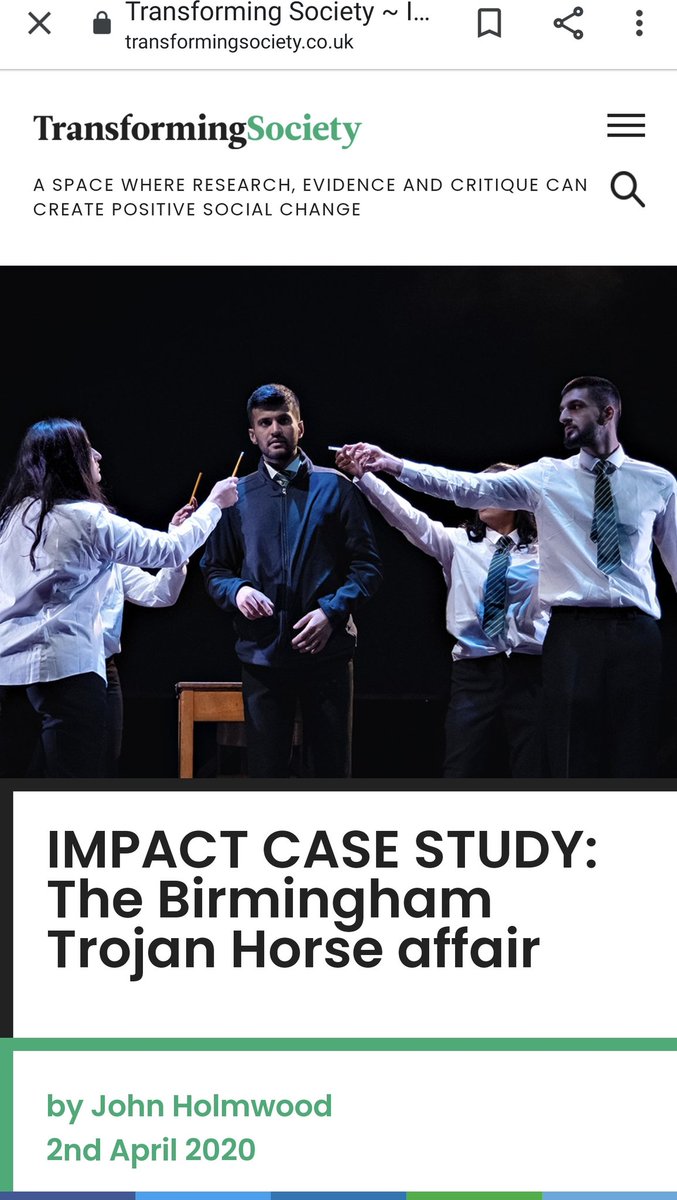
The #Prevent strategy had never before been the focus of #Ofsted #inspections in this way.”
Consequently, since there was no #evidence of “extremism”, the Prevent strategy came to rescue the #political #agenda set upon the whole affair.


Consequently, since there was no #evidence of “extremism”, the Prevent strategy came to rescue the #political #agenda set upon the whole affair.



Ofsted were then “able to find fault with the schools for not doing more to protect children against it” (Barton ^ Hatcher 2014, 458).
Equally, it is significant to note that these Ofsted reports were not published for a long time, only with regular #leaks to the #press
Equally, it is significant to note that these Ofsted reports were not published for a long time, only with regular #leaks to the #press

20 calls from Birmingham Members of Parliament (MPs) to publish the reports & to work in partnership with the Council for a single coordinated inquiry were resisted by the then Secretary of State (Barton and Hatcher 2014, 458).
A headteacher found the experience “harrowing” and “unlike any other inspection” (Pidd 2014b). Tim Brighouse (2014), a former Chief Education Officer in Birmingham, worried that its behaviour would challenge the political independence of Ofsted as a neutral & professional body.
Some were worried about the possible politicisation of the inspectorate (Baxter Forthcoming). An assistant principal, whilst presenting oral evidence, claimed that inspectors’ “lines of questioning were not impartial. They followed very narrow agendas
Their use of evidence was very selective” (HM Govn 2015, 15). The reliability & robustness of their judgements were questioned as they may have “lost objectivity and came to some overly negative conclusions because of the surrounding political and media storm” (HM Govn 2015, 30)
Prior to Ofsted’s intervention with Birmingham schools, Miah (2014) claimed that they carried a degree of trust, legitimacy and transparency within Muslim communities.
The processes followed by those responsible for oversight of the investigation and the recommendations made in the various reports were the main subject matter of a recent House of Commons report. 

In delineating the reliability & robustness of these inspections, the Committee noted: “The outcome of the Ofsted investigations has raised questions about the org itself, including how the inspections in Birmingham were conducted & the reliability of Ofsted inspections more gene
the reliability of Ofsted inspections more generally” (HM Govn 2015, 15. S31; Kershaw 2014, 14. S54). These observations provide another reason for studying Ofsted reports.
However, in defence, Her Majesty’s Chief Inspectorate (HMI) Wilshaw (2014) noted that some schools
However, in defence, Her Majesty’s Chief Inspectorate (HMI) Wilshaw (2014) noted that some schools
Her Majesty’s Chief Inspectorate (HMI) Wilshaw (2014) noted that some schools previously judged to be good or outstanding experienced high levels of staff turbulence, low staff morale and a rapid decline in their overall effectiveness.
#Radicalisation in three main reports
In terms of the parameters set for this study, first, it is significant to examine the major reports for radicalisation. The 214 page Kershaw report reveals 5 instances: once in the main text,
In terms of the parameters set for this study, first, it is significant to examine the major reports for radicalisation. The 214 page Kershaw report reveals 5 instances: once in the main text,
the rest in appendices, which explains the #Prevent agenda. The single time Kershaw (2014, 4) uses the word is in his executive summary, where he states: “There is no evidence of a conspiracy to promote an anti-British agenda, violent extremism or radicalisation in schools
he states: “There is no evidence of a conspiracy to promote an anti-British agenda, violent extremism or radicalisation in schools in East Birmingham.”
Ofsted: doesn't adequately prepare pupils for
life for Modern Britain



Ofsted: doesn't adequately prepare pupils for
life for Modern Britain




Ofsted: preparing pupils for life in #ModernBritain
'What #lesbians did?'
knew any girls or boys who thought they were in the 'wrong body'
#BritishValues
(Ofsted gave Best Practice to Educate & Celebrate a Queering the Education System project)

'What #lesbians did?'
knew any girls or boys who thought they were in the 'wrong body'
#BritishValues
(Ofsted gave Best Practice to Educate & Celebrate a Queering the Education System project)


REPEAT
There is no evidence of a conspiracy to promote an anti-British agenda, violent extremism or radicalisation in schools in East Birmingham.”
There is no evidence of a conspiracy to promote an anti-British agenda, violent extremism or radicalisation in schools in East Birmingham.”
In the 129 page Clarke report there are 10 instances: five for absolving himself from bias, four are related to his #concerns about young people’s #vulnerability to radicalisation and one appears in his terms of reference.
In the BCC Report, there were seven instances, of which, four refer to radicalisation.
The rest concern the radical shift required by the Council.
Consequently, the House of Commons Education Committee (HM Government 2015, 29. S80) concurred with Clarke
The rest concern the radical shift required by the Council.
Consequently, the House of Commons Education Committee (HM Government 2015, 29. S80) concurred with Clarke
the House of Commons Education Committee (HM Government 2015, 29. S80) concurred with Clarke & Kershaw & categorically concluded that there was, “No evidence of extremism or radicalisation, apart from a single #isolated incident, was found by any of the inquiries
categorically concluded that there was, “No evidence of extremism or radicalisation, apart from a single isolated incident, was found by any of the inquiries & there was no evidence of a sustained plot nor of a similar situation pertaining elsewhere in the country.” 







In addition, it also emphasised that “All our witnesses also accepted that they had found no evidence of extremism in schools” (HM Government 2015, 6. S8). 
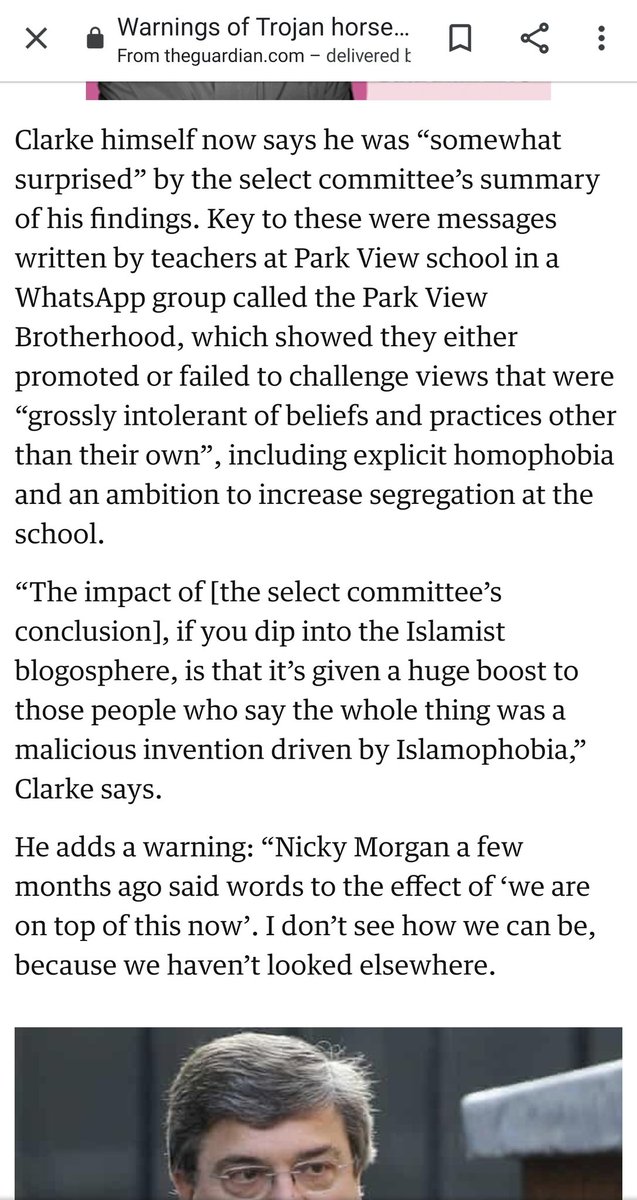
The single instance was reported by Kershaw. He told the Committee that “he had evidence that a film promoting violent jihadist extremism had been shown to children in one classroom & the teacher had not been disciplined” (HM Government 2015, 6. S8). 




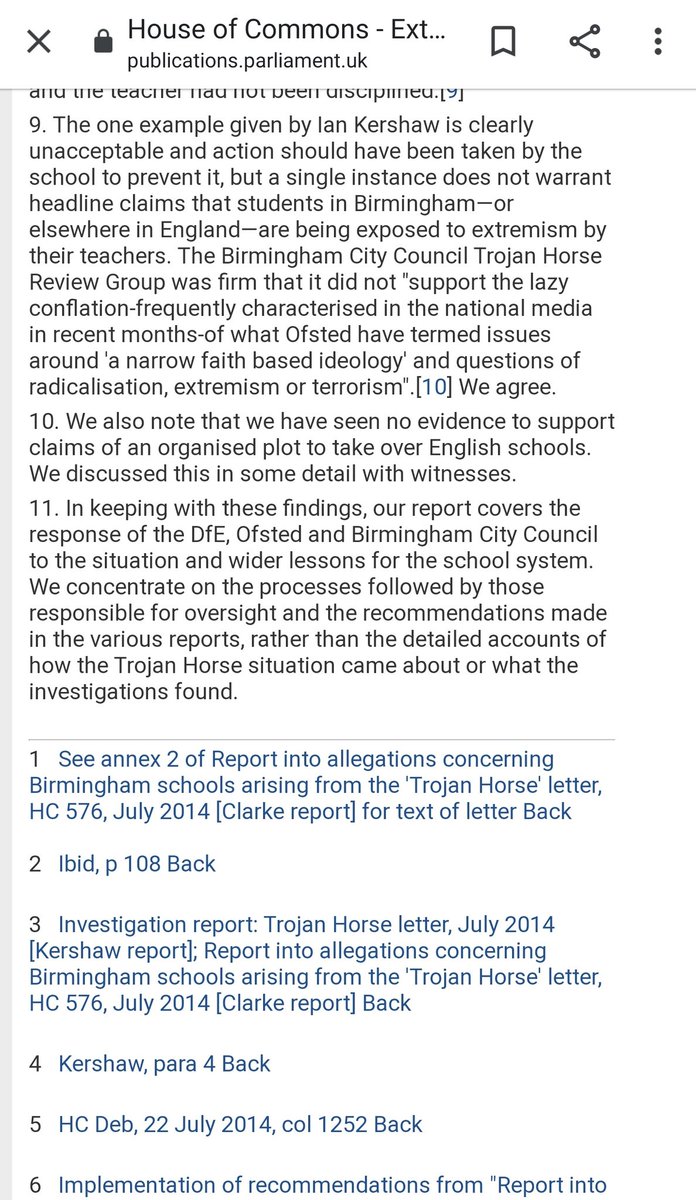


However, neither a film nor a video is mentioned in his own report. Accordingly, a solitary example of this kind is unacceptable & the school should have acted to prevent it. However, “a single instance does not warrant headline claims that students in Birmingham – or elsewhere
a single instance does not warrant headline claims that students in Birmingham – or elsewhere in England – are being exposed to extremism by their teachers.” (HM Govn 2015, 6–7. S9). Unfortunately, the Committee is silent about the film: why it was shown nor who had produced it.
This article addresses, through textual analysis, the key question: what did Ofsted find and report about radicalisation? This should enable the identification of the nature of its usage, the extent of the “problem” or lack of it in these schools
#Ofsted
This should enable the identification of the nature of its usage, the extent of the “problem” or lack of it in these schools and what, if anything, were the schools instructed to do to minimise #radicalisation in schools.
*Queering & Infiltrating Best Practice



This should enable the identification of the nature of its usage, the extent of the “problem” or lack of it in these schools and what, if anything, were the schools instructed to do to minimise #radicalisation in schools.
*Queering & Infiltrating Best Practice




@threadreaderapp unroll
39:14
Why things don't move from Headline to Court Case
My favourite example
Andrew Gillinghan promoting the idea
that Al Qaeda video were recorded by the Media dept of the school.
It turns out that that comes from the school recording a Panorama
Why things don't move from Headline to Court Case
My favourite example
Andrew Gillinghan promoting the idea
that Al Qaeda video were recorded by the Media dept of the school.
It turns out that that comes from the school recording a Panorama
https://twitter.com/luminatus1/status/1443564621307252746?s=19
39:14 It turns out that that comes from the school recording a Panorama TV programme about issues of terrorism on which Al Qaeda videos are part of the Panorama presentation
that the school was doing it at the request of West Midlands Police
that the school was doing it at the request of West Midlands Police
school recording a Panorama TV programme abt issues of terrorism on which Al Qaeda videos are part of the Panorama presentation thtschool was doing it at the request of West Midlands Police cos WMPolice were coming into school to give a session on the dangers of radicalisation 





• • •
Missing some Tweet in this thread? You can try to
force a refresh

























